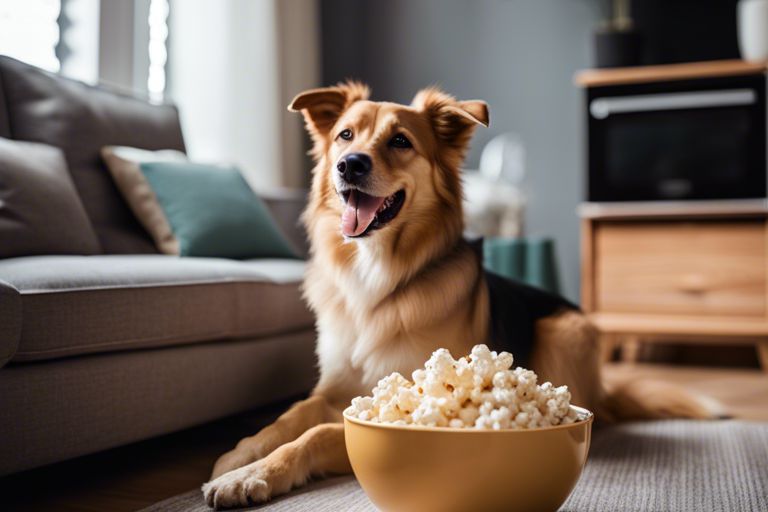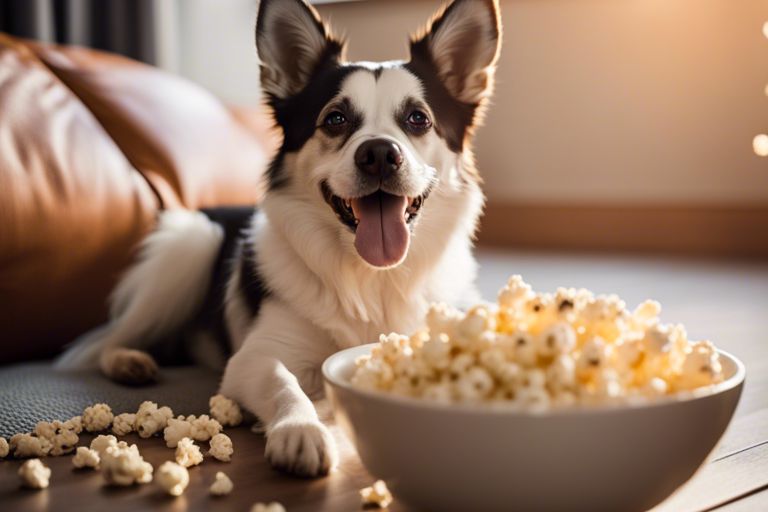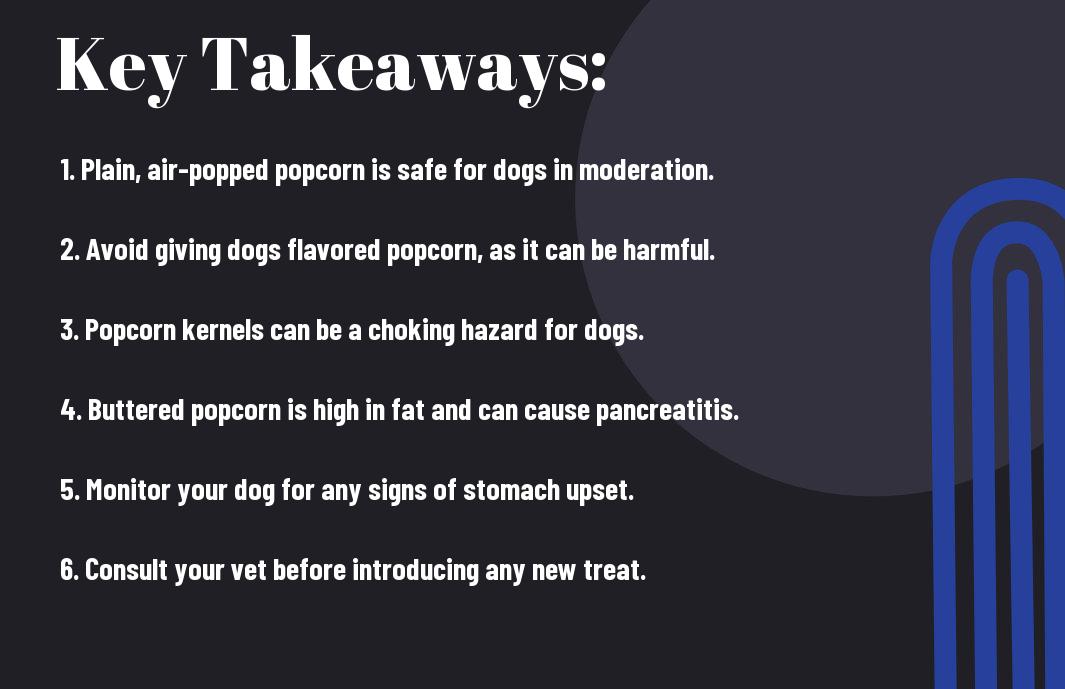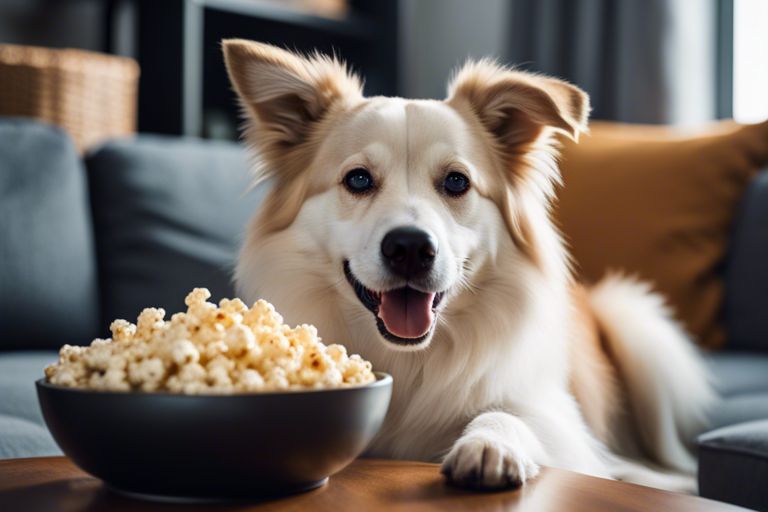Dogs, our faithful companions, often enjoy sharing our snacks. But when it comes to popcorn, pet owners may wonder whether it is safe for their furry friends to indulge in this popular movie-time treat. In this informative post, we will explore the potential risks and benefits of feeding popcorn to dogs, shedding light on this common query among dog owners.
Key Takeaways:
- Plain, unsalted popcorn is safe for dogs: Popcorn can be a tasty and low-calorie snack for dogs, as long as it is plain and unsalted.
- Avoid butter and seasonings: Dogs should not eat popcorn with butter, salt, or any other seasonings, as these can be harmful to their health.
- Feed in moderation: While popcorn can be given to dogs as an occasional treat, it should not be a regular part of their diet to prevent any potential health issues.

The Popcorn Conundrum
What’s in popcorn that raises concerns?
Popcorn can be a delicious and seemingly harmless snack for humans, but when it comes to our furry friends, there are some potential risks to consider. The main concern with popcorn is the hard kernels or unpopped pieces, which can pose a choking hazard to dogs, especially for smaller breeds or those with dental issues.
The human obsession with sharing snacks with dogs
Raises in the air, the enticing aroma of freshly popped popcorn often leads to our canine companions giving us their best puppy eyes, hoping to score a piece of the crunchy treat. As pet owners, it’s natural to want to share everything with our dogs, including snacks like popcorn. However, it’s necessary to remember that not all human foods are safe for dogs, and some can even be harmful to their health.
The human-animal bond is undeniably strong, and sharing food can feel like a way to connect with our dogs on a deeper level. However, it’s crucial to prioritize our pets’ well-being and make informed decisions when it comes to sharing snacks like popcorn with them.
Canine Nutrition Basics
A dog’s digestive system: how it differs from humans
Nutrition is a crucial aspect of your dog’s overall health and well-being. It’s crucial to understand that a dog’s digestive system is different from that of humans. Dogs are primarily carnivores, meaning their digestive system is designed to process animal protein efficiently. Their stomach acid is more acidic than that of humans, allowing them to break down raw meat and bones effectively.
Essential nutrients for a healthy canine diet
Healthy canine nutrition requires a balance of crucial nutrients to support your dog’s growth, development, and overall health. Dogs need a mix of protein, fats, carbohydrates, vitamins, and minerals in their diet to thrive. Protein is crucial for muscle growth, repair, and maintenance, while fats provide energy and support skin and coat health.
With that in mind, it’s crucial to choose high-quality dog food that meets your pet’s nutritional needs. Look for complete and balanced formulas that provide the right mix of nutrients to keep your dog healthy and happy.
The Effects of Popcorn on Dogs
Choking hazards: a real risk for small breeds
To ensure the safety of your furry companion, it’s vital to be aware of the potential choking hazards associated with popcorn consumption, especially for small dog breeds. Any small, hard kernels or uncooked pieces can pose a serious risk if ingested by a small dog. These pieces can easily become lodged in their throat, leading to choking or even more severe consequences.
Allergies and sensitivities: what to watch out for
Choking hazards are not the only concern when it comes to feeding popcorn to your dog. Some dogs may have allergies or sensitivities to certain ingredients commonly found in popcorn, such as butter, salt, or even corn itself. Plus, the added seasonings or flavorings often found on popcorn can also trigger adverse reactions in sensitive pups.
It’s crucial to monitor your dog for any signs of allergies or sensitivities, such as itching, redness, gastrointestinal upset, or changes in behavior after consuming popcorn. If you suspect your dog is having a negative reaction, it’s best to consult your veterinarian immediately.
Digestive issues: from mild discomfort to severe reactions
Effects on your dog’s digestive system are another factor to consider when contemplating giving them popcorn. While some dogs may handle popcorn with no issues, others can experience a range of digestive problems, from mild discomfort to severe reactions. The high fiber content in popcorn can lead to gastrointestinal issues like bloating, constipation, or diarrhea in some dogs.
If you notice any signs of digestive distress after your dog eats popcorn, such as excessive gas, vomiting, or changes in their stool, it’s wise to avoid feeding them popcorn in the future to prevent further discomfort.
Based on the article title “Can dogs eat popcorn?”, I detect that the article type is Informative/ Educational, and I’ll choose a tone inspired by the famous writer Malcolm Gladwell, known for his engaging and informative writing style.
The Role of Additives and Toppings
Salt and fat content: a recipe for disaster?
Once again, it’s vital to consider the additives and toppings commonly found on popcorn when assessing whether it is safe for dogs to consume. Salt and fat content in many commercially available popcorn products can be a recipe for disaster when it comes to your canine companion’s health.
Artificial flavorings and colorings: potential toxins
To further complicate matters, artificial flavorings and colorings often found in popcorn can pose potential risks to your dog. These additives can be toxic to dogs and may lead to gastrointestinal issues or allergic reactions.
To ensure your dog’s safety, it’s crucial to be mindful of the ingredients used in popcorn and opt for natural or plain varieties without any additives when sharing this snack with your furry friend.
The dangers of caramel and cheese coatings
Additives such as caramel and cheese coatings, while delicious to us, can be dangerous for dogs. These toppings often contain high levels of sugar, salt, and artificial flavors that can be harmful to your pet’s health.
Plus, the sticky nature of caramel can pose a choking hazard, especially for smaller dog breeds. It’s best to steer clear of popcorn with these coatings when sharing a snack with your canine companion.
Safe Alternatives for Your Furry Friend
For Can dogs eat popcorn? How to safely feed your pup, it’s vital to consider safe alternatives for your canine companion. While popcorn may not be the best choice due to potential choking hazards and unhealthy additives like butter and salt, there are plenty of other healthy options you can offer your furry friend.
Healthy snack options for dogs
The next time you’re looking to treat your dog, consider offering them some safe and delicious alternatives to popcorn. Carrots, green beans, and apple slices are all excellent choices that are low in calories and high in nutrients. You can also try offering your pup some blueberries, strawberries, or banana slices for a sweet and healthy snack.
Homemade treats: a safer, tastier choice
snack on some homemade treats for your dog can be a much safer and tastier choice than store-bought options. By making your own treats, you can control the ingredients and ensure that your pup is getting a healthy and delicious snack. Plus, it can be a fun bonding activity for you and your furry friend!
With a little creativity and some simple ingredients like peanut butter, pumpkin, and oats, you can whip up some tasty treats that your dog will love. Whether you choose to bake them into cookies or freeze them into refreshing popsicles, homemade treats are sure to be a hit with your pup.
What to Do If Your Dog Eats Popcorn
Identifying symptoms of popcorn-related distress
Unlike some toxic foods that can cause immediate and severe reactions in dogs, popcorn is generally safe in moderation. However, if your furry friend consumes a large amount or has a sensitivity to popcorn, you may notice some distressing symptoms.
First aid and emergency procedures
Your first step should be to contact your veterinarian if you suspect your dog has eaten a concerning amount of popcorn or is displaying unusual symptoms. They can provide guidance on what steps to take next and whether a trip to the clinic is necessary.
To ensure your dog’s safety, it’s imperative to keep popcorn and other potentially harmful snacks out of reach. If your pet has a history of getting into food they shouldn’t, consider crate training or using gates to limit access to certain areas of your home.
Preventing future mishaps: setting boundaries and supervision
Popcorn can be a tempting treat for dogs, but it’s vital to establish boundaries and supervise your pet’s snacking habits. Make sure to educate family members and guests about the risks of sharing popcorn with your furry friend to avoid any accidental ingestion.
The well-being of your dog is in your hands, so it’s crucial to stay vigilant and proactive in preventing any mishaps or emergencies related to food consumption.
To wrap up
Ultimately, while popcorn may seem like a harmless treat, it’s important to be cautious when sharing it with your furry friend. Some dogs may have no issues enjoying a few pieces of plain, air-popped popcorn as an occasional snack, but it’s crucial to avoid adding any salt, butter, or other flavorings that could be harmful to their health. Always consult with your veterinarian before introducing any new foods to your dog’s diet to ensure their safety and well-being.
FAQ
Q: Can dogs eat popcorn?
A: Dogs can technically eat popcorn, but it is not recommended due to potential risks of choking, digestive issues, and the high salt and butter content in many popcorn varieties.
Q: What are the potential risks of dogs eating popcorn?
A: The potential risks of dogs eating popcorn include choking hazards from unpopped kernels, digestive issues from the hulls, and the high salt and butter content leading to obesity or pancreatitis.
Q: Are there any safe alternatives to popcorn for dogs to enjoy as a treat?
A: Yes, there are many safe alternatives to popcorn for dogs, such as carrots, green beans, plain air-popped popcorn (without salt or butter), or specific dog-friendly treats from pet stores.
Q: How can I safely give popcorn to my dog if I still want to share this snack with them?
A: If you still want to share popcorn with your dog, make sure it is plain, air-popped popcorn without any salt, butter, or seasonings. Also, break the popcorn into small pieces to reduce the risk of choking.
Q: What signs should I look out for if my dog accidentally eats popcorn and experiences issues?
A: If your dog accidentally eats popcorn and experiences issues such as vomiting, diarrhea, lethargy, or difficulty breathing, contact your vet immediately for guidance and possible treatment.
Are strawberries toxic for dogs
Demystifying Anal Gland Issues in Dogs: Your Comprehensive Guide from the American Kennel Club



